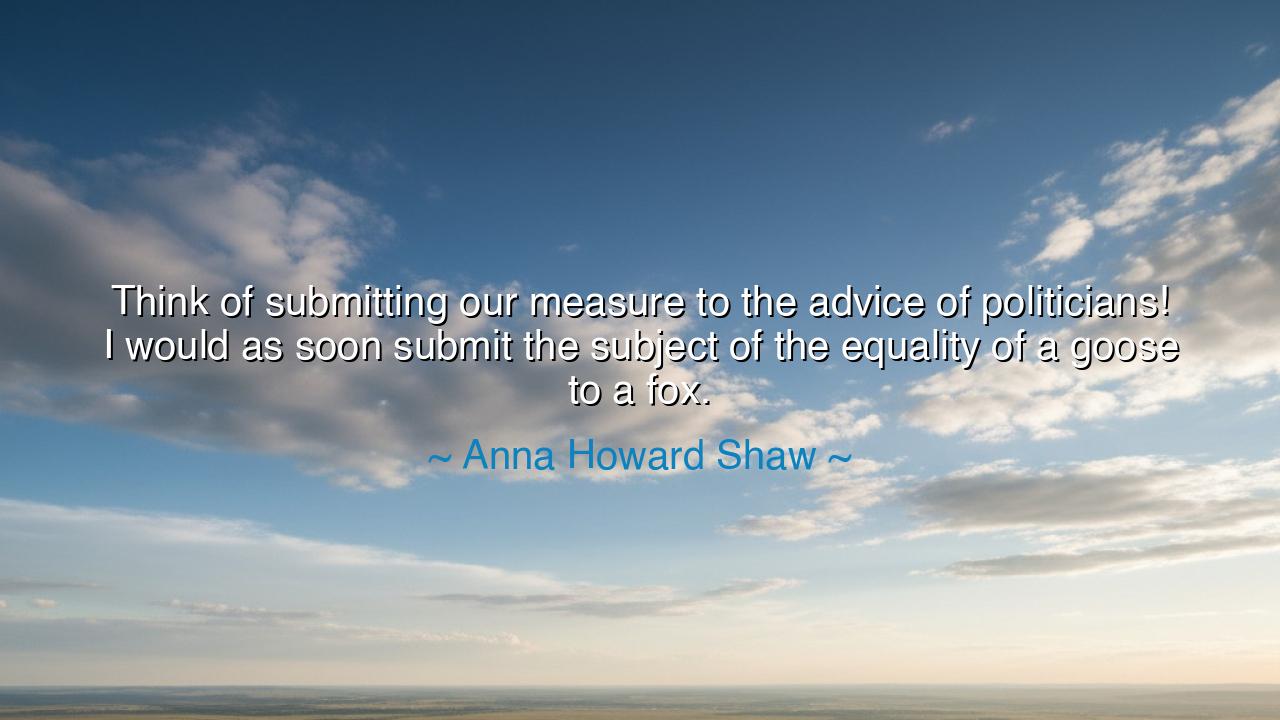
Think of submitting our measure to the advice of politicians! I
Think of submitting our measure to the advice of politicians! I would as soon submit the subject of the equality of a goose to a fox.






The words of Anna Howard Shaw, “Think of submitting our measure to the advice of politicians! I would as soon submit the subject of the equality of a goose to a fox,” burn with wit, indignation, and courage — the voice of a woman who refused to let justice be defined by those who feared it. Beneath the humor of her comparison lies a fierce wisdom: that those who benefit from inequality cannot be trusted to decide its end. Her imagery — the goose representing the vulnerable, the fox symbolizing the cunning oppressor — captures a truth older than time itself: the powerful rarely surrender power willingly. To ask them to arbitrate justice is to invite the devourer to guard the flock.
To understand the origin of her words, we must remember Anna Howard Shaw as one of the great warriors of the women’s suffrage movement in America. Born in 1847, she was not only a suffragist but also a physician, minister, and orator — one of the first women to be ordained in the Methodist ministry. In her lifetime, women were denied the right to vote, to govern, and to control their own destinies. When Shaw spoke these words, she was responding to the suggestion that women’s suffrage — the right to vote — should be left to the discretion of male politicians. Her answer was thunderous and clear: justice should never be placed in the hands of those who profit from injustice.
Her metaphor recalls the ancient wisdom of fable and myth. In Aesop’s tales, the fox is always clever, sly, and self-serving, using deception to ensnare the unsuspecting. Shaw’s “goose and fox” imagery mirrors this timeless truth — that those who hold power often cloak their self-interest in rhetoric. She warns against the folly of expecting wolves to defend lambs or tyrants to advocate for freedom. In her time, men dominated the political realm, and many resisted women’s advancement not from reason, but from fear — fear of losing privilege, fear of change. To ask such men to decide the worth of women was, in Shaw’s eyes, as absurd as letting the predator write the laws of the hunted.
History offers countless reflections of her insight. When Frederick Douglass fought for the abolition of slavery, he faced similar resistance from lawmakers whose fortunes were tied to bondage. When the Chartists of Britain demanded voting rights for the working class, Parliament — composed of wealthy elites — denounced them as radicals. In every age, the oppressed have been told to wait patiently while the privileged deliberate their freedom. Yet, as Shaw and those before her knew, justice delayed is not justice preserved — it is justice denied. Her scorn was not aimed merely at politicians, but at complacency itself — at the belief that reform can come from those who have no incentive to enact it.
In Shaw’s age, women were often told they were too emotional, too unfit for the rational world of governance. Yet it was precisely this rational hypocrisy she exposed. Her sarcasm was a weapon, polished by intellect and sharpened by truth. To “submit our measure” — the demand for suffrage — to politicians was to surrender the sacred cause of equality to the very gatekeepers who profited from exclusion. In her defiance, Shaw joined the lineage of voices like Mary Wollstonecraft and Susan B. Anthony, who proclaimed that rights are not granted by the powerful; they are claimed by the deserving.
The moral fire of her quote endures beyond her time. Even today, when systems of power remain entrenched in self-interest, her words remind us that true reform does not come from appeasement, but from conviction. The oppressed must never beg the oppressor for understanding — they must stand firm in truth, for justice is not a favor to be bestowed, but a birthright to be reclaimed. Shaw’s goose refuses to plead for equality before the fox; instead, it learns to fly — to rise above fear and dependency.
Let this be the lesson passed down to future generations: never entrust your freedom to those who profit from your silence. Seek counsel from wisdom, not from authority; measure justice not by what is permitted, but by what is right. Be wary of the fox who smiles, who promises fairness while guarding the gate. For equality must never be negotiated in fear — it must be pursued with courage.
Thus, Anna Howard Shaw’s words echo through the corridors of time as both warning and inspiration. She teaches that the road to justice is not paved by the hands of the powerful, but by the resolve of the brave. Her spirit calls to all who still struggle — to women, to the marginalized, to the unheard — to trust not in the mercy of those above, but in the strength of their own wings. For the cause of equality, once awakened, cannot be tamed — not by foxes, nor by kings, nor by any force that stands against truth.






AAdministratorAdministrator
Welcome, honored guests. Please leave a comment, we will respond soon